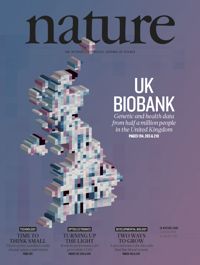Stephen, Damjan & Allan score cover of Nature
UK Biobank paper published in Nature
The UK Biobank resource with deep phenotyping and genomic data
Clare Bycroft, Colin Freeman, Desislava Petkova, Gavin Band, Lloyd T. Elliott, Kevin Sharp, Allan Motyer, Damjan Vukcevic, Olivier Delaneau, Jared O’Connell, Adrian Cortes, Samantha Welsh, Alan Young, Mark Effingham, Gil McVean, Stephen Leslie, Naomi Allen, Peter Donnelly & Jonathan Marchini
Nature, Volume 562, pages 203–209 (2018)
UK Biobank: largest human genetic study is launched
Stephen Leslie, Damjan Vukcevic and Allan Motyer have contributed to the world’s largest genetic study on humans, providing a first-of-its kind resource for health researchers across the globe to further medical research and drug development and potentially provide more efficient and personalized treatments of diseases.
The UK Biobank project has collected dense genetic data from across the whole genome for approximately 500,000 people, aged between 40 and 69 at the time of recruitment, from across the United Kingdom.
It is a unique resource, combining genetic information with detailed health records in an open-source, shared model for all researchers to understand how our genetic code influences disease.
The health-related information available on participants includes biological measurements, lifestyle indicators, biomarkers in blood and urine and imaging of the body and brain. All participants provided consent to link to their electronic health records, which gives access to disease diagnoses, hospital admission and death records as the project progresses.
MIG's own Stephen Leslie led the Australian research team.
“The UK Biobank will transform human genetics research, giving scientists around the world access to a rich sample of unprecedented size and scope on which to explore innumerable hypotheses relating genetics to biology and disease,” Associate Professor Leslie said.
He led a team comprising Dr Damjan Vukcevic and Dr Allan Motyer from the University of Melbourne to generate genetic data related to the immune system, as well as quality testing these data.
See more here:
http://newsroom.melbourne.edu/news/uk-biobank-largest-human-genetic-study-launched
newsroom.melbourne.edu The UK Biobank project has collected dense genetic data from across the whole genome for approximately 500 000 people, aged between 40 and 69 at the time of recruitment, from across the United Kingdom. It is a unique resource, combining genetic information with detailed health records in an open-source, shared model for all researchers to understand how our genetic code influences disease. |
